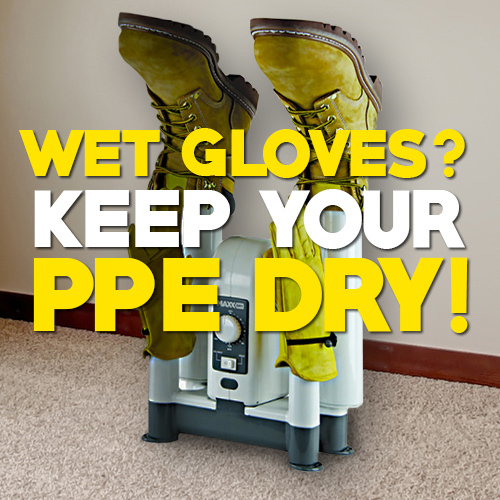What is the Best Material for Chemical Resistant Gloves?
7 July 2016 | Alex
If you're working with chemicals, you'll definitely be aware of the importance of having the right safety gloves for the task. Not using the correct chemical resistant gloves can cause a whole host of problems ranging from rawness and irritation to serious and irrevocable damage. It's only natural that you might want to find the best gloves for chemicals and here at Safety Gloves, we're here to help you do it!
Horses for Courses
Unfortunately, there is no easy answer as to which gloves you should use if you are dealing with chemicals – all chemicals are different and the type of glove that you need might be different too. Luckily for you, we've taken the trouble to check whether some of our most popular gloves are suitable for use with common chemicals. Our choice of gloves includes three of the most commonly used materials (especially for disposable/lab gloves): nitrile gloves, latex gloves and vinyl gloves.
To check which gloves are best for your needs, please find the chemicals that you wish to protect against and see the suitability in our chart!
| Chemical | Nitrile Gloves | Latex Gloves | Vinyl Gloves |
| Acetaldehyde | Poor | Fair | Poor |
| Acetic Acid | Good | Good | Good |
| Acetone | Poor | Poor | Poor |
| AcetoNitrile | Poor | Poor | Poor |
| Acrylic Acid | Good | Good | Fair |
| Acrylamide | Excellent | Excellent | |
| Ammonia | Fair | Poor | |
| Ammonia Fluoride | Excellent | Excellent | |
| Ammonia Hydroxide | Excellent | Good | Good |
| Aniline | Poor | Poor | Fair |
| Benzaldehyde | Poor | Poor | Poor |
| Benzalkonium Chloride | Good | Good | |
| Benzene | Poor | Poor | Poor |
| Boric Acid | Excellent | | |
| Carbon Disulfide | Poor | Poor | Poor |
| Carbon Tetrachloride | Fair | Poor | |
| Chlorhexidine | Excellent | Excellent | Excellent |
| Chloroform | Poor | Poor | Poor |
| Chromic Acid | Excellent | Poor | |
| Citric Acid | Excellent | Excellent | Excellent |
| Cyclohexane | Excellent | Poor | |
| Cyclohexanol | Excellent | Good | Good |
| Cyclohexanone | Poor | Poor | Poor |
| Diacetone Alcohol | Good | Poor | Poor |
| Dichloromethane | Poor | Poor | Poor |
| Diethyl Ether | Poor | | |
| Dioctyl Phthalate | | Poor | Poor |
| Diesel Fuel | Good | Poor | Fair |
| Diethylamine | Poor | Poor | Poor |
| Dimethyl Sulfoxide (DMSO) | Poor | Poor | Poor |
| Dimethylformamide (DMF) | Poor | Poor | Poor |
| Ethanol | Poor | Poor | Poor |
| Ethanolamine | Excellent | Good | |
| Ethidium Bromide | Excellent | Excellent | Excellent |
| Ethyl Acetate | Poor | Poor | |
| Ethyl Ether | Poor | Poor | Poor |
| Ethylene Glycol | Excellent | Excellent | Excellent |
| Formaldehyde 37% | Excellent | Poor | Poor |
| Formic Acid 90% | Good | Good | |
| Furfural | Poor | Poor | |
| Gasoline/Petrol | Fair | Poor | Poor |
| Glacial Acetic Acid | Poor | Poor | Poor |
| Glutaraldehyde 5% | Excellent | Excellent | Good |
| Glycerol | Excellent | Excellent | Excellent |
| Heptane | Excellent | Poor | |
| Hexane | Good | Poor | Poor |
| Hydrazine | Excellent | Good | Excellent |
| Hydrochloric Acid 30 - 70% | Good | Fair | |
| Hydrochloric Acid <30% | Excellent | Excellent | |
| Hydrofluoric Acid 48% | Good | Fair | |
| Hydrogen Peroxide 30% | Excellent | Excellent | Excellent |
| Isopropyl Alcohol | Good | Fair | Fair |
| Kerosene | Excellent | Poor | Good |
| Jeffamine | Excellent | | |
| Lactic Acid | Excellent | Excellent | |
| Lauric Acid 30% | Excellent | Poor | Poor |
| Linseed Oil | Poor | Poor | Poor |
| Maleic Acid | Excellent | | |
| Methanol | Poor | Poor | Poor |
| Methyl Ethyl Ketone | Poor | Poor | Poor |
| Methyl Isobutyl Ketone | Poor | Poor | Poor |
| Methyl Methacrylate | Poor | Poor | |
| Methylamine | Excellent | Fair | |
| Mineral Spirits | Excellent | Poor | |
| Nitric Acid 10% | Excellent | Excellent | Excellent |
| Octanol | Excellent | | |
| Octyl Alcohol | Excellent | Good | |
| Oleic Acid | Excellent | Fair | |
| Palmitic Acid | Good | Poor | |
| Pentane | Poor | Poor | Poor |
| Phenol | Poor | Poor | Poor |
| Phosphoric Acid 30% | Excellent | Excellent | Excellent |
| Picric Acid | Poor | | |
| Potassium Hydroxide 30% | Excellent | Excellent | Excellent |
| Propanol | Poor | Poor | |
| Sodium Carbonate | Excellent | | |
| Sodium Chloride | Excellent | Excellent | |
| Sodium Hydroxide 30% | Excellent | Excellent | Excellent |
| Sodium Hypochlorite | Excellent | Excellent | |
| Sulphuric Acid 30% | Excellent | Excellent | Excellent |
| Sulphuric Acid 95% | Poor | Poor | Poor |
| Tannic Acid 65% | Excellent | Excellent | |
| Tetrachloroethylene | Fair | Poor | Poor |
| Tetrahydrofuran | Poor | Poor | Poor |
| Toluene | Poor | Poor | Poor |
| Trichloroethane | Poor | Poor | Poor |
| Turpentine | Excellent | Poor | Poor |
| Xylene | Poor | Poor | Poor |
Choosing Your Gloves
As you can see from the table above, for some chemicals, disposable gloves simply don't offer the right level of protection for your needs. In these cases, why not call us on 020 7501 1104 with your specific requirements and we should be able to recommend a suitable pair of work gloves for you.








